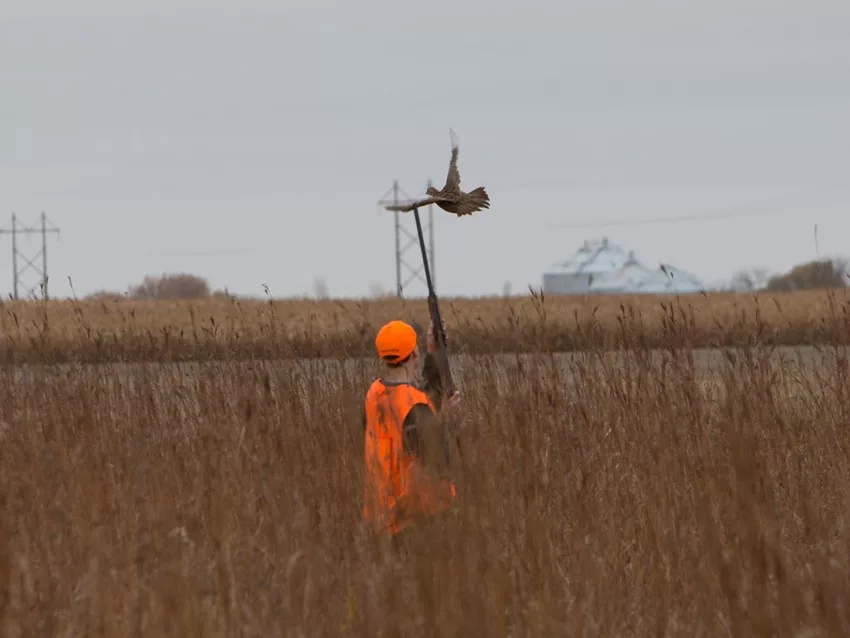
With no gun in hand, it’s easier for mentors to help with the hunt, including identifying hen and rooster pheasants, along with other birds observed in a walk designed just to help new hunters get acclimated to the experience. Simonson Photo.
By Nick Simonson
Mentored hunts, whether part of an organization’s efforts to get new hunters into the field, or simply a one-on-one introduction between a veteran and novice are a big part in recruiting and retaining individuals who will not only enjoy the new experiences they have in the field, but likely will keep them coming back and make them advocates as well for conservation and the preservation of those opportunities. At the risk of stressing the fact, a lot rides on a first hunt and the mentoring process associated with it. What follows are some suggestions for setting up the most complete mentored hunt and set the stage for a lifetime of adventure and advocacy in a new hunter.
Plan For Success
Utilizing time ahead of an event, or a scheduled first trip into the field, make sure the mentored hunter is prepared for what’s to come. This means setting out expectations of what may be seen in the field, and how a hunter reacts to an incoming set of ducks or the excitement of a flushing rooster or grouse and how a dog is involved in both. In addition, time at the range shooting clay targets and assuring safe firearm use is crucial to help a new hunter feel comfortable ahead of those first steps in the field. Arrange a meeting time for these events and build up to the day of the hunt. When the big day arrives bake in breaks for lunch or travel and set out the locations of private or public land that will be utilized in the process. Additionally, these preparatory opportunities give the mentor and the mentee a chance to learn more about each other and develop a bond that fosters familiarity and better learning in the field.
Gear Up
The mentoring hunter often has extra gear that can be shared with the mentee, but some items should remain personal to the new hunter, particularly bows or firearms. If the new hunter does not own either, add in some extra time in the planning process – sometimes a few months in advance – so that person can become safe, familiar and competent with the chosen bow or gun. While ammo can be given by the mentor to the novice hunter, it’s often best to advocate for a certain type for the chosen quarry and let them purchase and experiment with what loads work best for them. If it comes down to camo, blaze orange, and other basic clothing, odds are there are more than a few hats and vests accumulated in the back corners of a hunting closet that can be spared, if necessary to get someone started in the field.
Keep It Fun and Focused
The rigors of some hunting can be a challenge for novices. The experienced hunter may be able and willing to walk eight or ten miles in a hunting day to pursue a limit of pheasants, but a new hunter might be sore after mile two and ready to call it. Select parcels of land to explore that match the endurance and attention span of the mentored hunter, while still providing good huntable habitat that sets up opportunities for success. Whether it’s a youth season that requires adult mentors to be unarmed or not, it’s often best that the mentoring hunter not carry a firearm while accompanying the student on any mentored hunt. This works in two ways, the first being that the new hunter knows that he or she the only person taking a shot, and the second is that it allows the mentor to provide insight via voice and hand directions and ultimately a full focus on the mentoring process by pointing out changes in dog behavior or birdiness, identifying habitat transitions, or signaling upcoming opportunities instead of setting up a shot. At any time if the weather turns, the wind makes it difficult, or the mentee is ready to be done, it’s a good idea to wrap things up and take away from the event what was available, sharing lessons and tips from what was observed and when a follow-up hunt can be held.
With these strategies in mind, mentors can help provide the best experience in the field for new hunters, and point out that success – whether that’s birds in the bag or not – comes in many forms, from learning about habitat and animal biology, to developing future strategies for hunts to come. Through this planning and the efforts ahead of and during a mentored hunt, mentors can provide the best experience possible.
